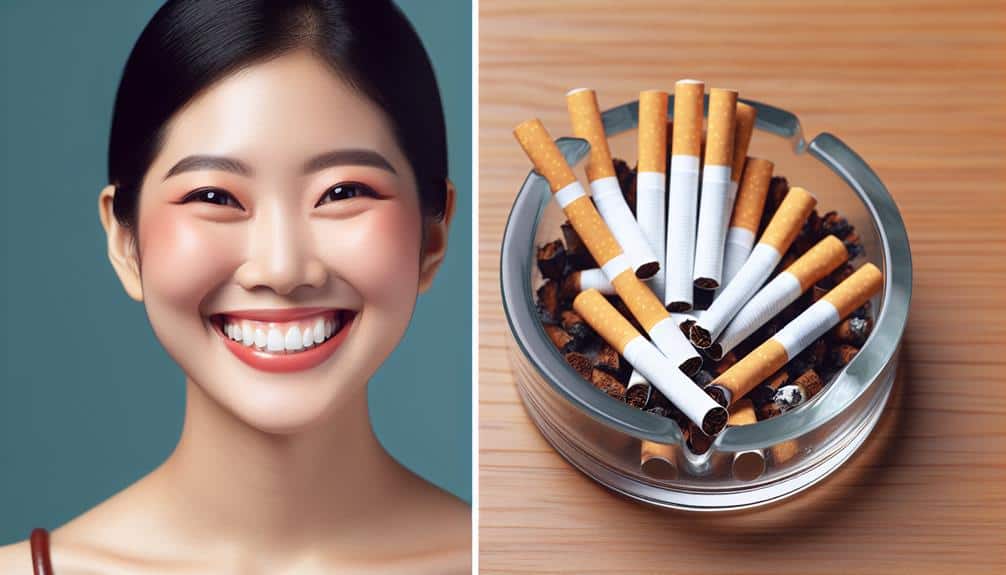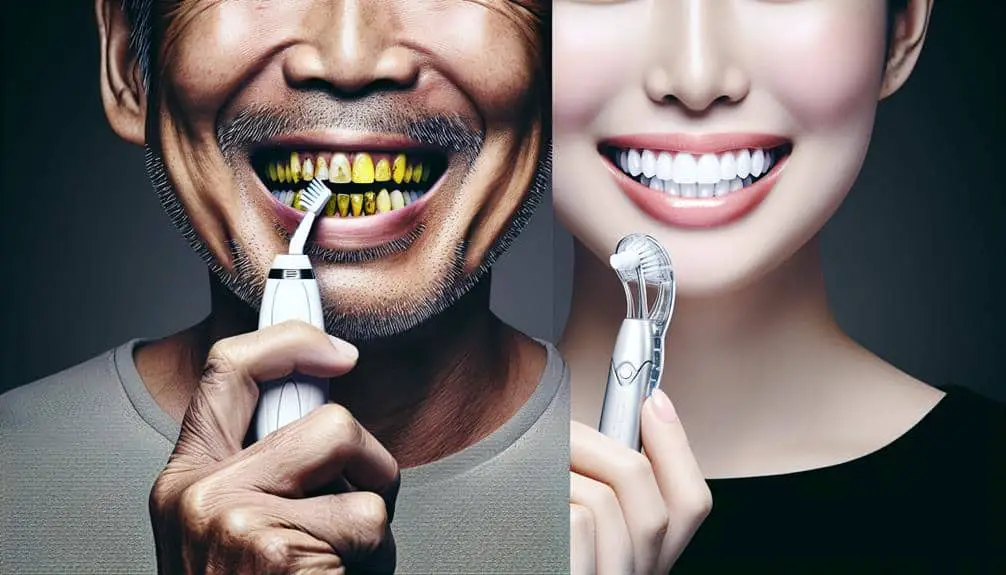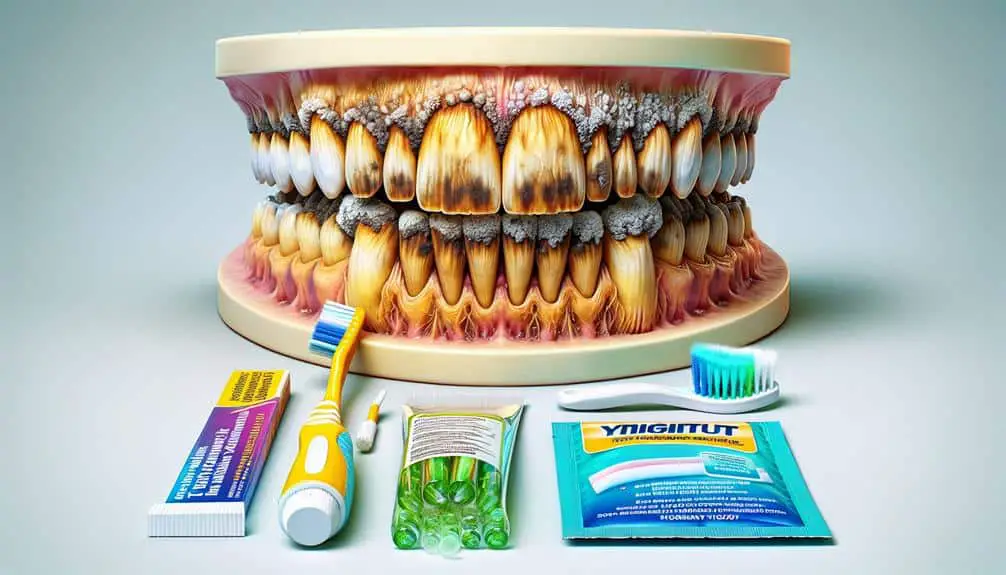Smokers' teeth naturally whiten because of reduced exposure to tar and nicotine, gradually lightening the stains caused by smoking. This improvement occurs over time as you smoke less, allowing your teeth to naturally recover from the discoloration. By understanding this process, you can make informed decisions about your oral health.
Key Points
- Quitting smoking reduces staining and allows natural enamel color to show.
- Improved oral hygiene after quitting can lead to teeth naturally whitening.
- Reduced exposure to tobacco smoke prevents further discoloration.
- Professional whitening treatments can help restore natural tooth color.
- Natural remedies and diet changes promote teeth whitening after quitting smoking.
Impact of Smoking Habits
If you smoke regularly, the impact on your teeth can be significant, leading to noticeable discoloration and staining over time. Beyond just the important concerns, smoking poses serious health risks to your oral cavity. The chemicals in tobacco smoke can cause gum disease, tooth decay, and even oral cancer.
Not only does smoking affect your oral health, but it also creates a financial burden. The cost of dental treatments to address the effects of smoking on your teeth can add up over time, whether it be teeth whitening procedures or more extensive interventions.
It is vital to contemplate the long-term consequences of smoking on your oral health and overall well-being. By understanding the health risks associated with smoking and the financial implications it can have on your dental care, you may be motivated to take steps to quit smoking and protect your teeth. Your oral health is an integral part of your overall health, and addressing smoking habits is a crucial step towards maintaining a healthy smile.
Natural Remedies for Teeth Stains
Natural remedies can be effective in reducing teeth stains caused by various factors, including smoking habits. When looking to improve the color of your teeth naturally, consider incorporating herbal remedies and making dietary changes into your routine.
Here are some home remedies and natural solutions you can try:
- Oil Pulling: Swishing coconut oil or sesame oil in your mouth for about 15-20 minutes daily may help reduce bacteria and plaque that cause stains.
- Baking Soda: Mixing a small amount of baking soda with water to create a paste can act as a mild abrasive to gently scrub away surface stains on your teeth.
- Apple Cider Vinegar: Diluting apple cider vinegar with water and using it as a mouthwash may help whiten teeth due to its acetic acid content that can kill bacteria.
These natural remedies can be beneficial in reducing teeth stains and improving the overall appearance of your smile. Remember to use them consistently and consult with your dentist if you have any concerns.
Diet Changes for Whiter Teeth
To promote whiter teeth, consider incorporating dietary changes that can support your oral health and enhance the brightness of your smile. Making diet modifications and lifestyle adjustments can play a significant role in improving the color of your teeth. Foods rich in fiber, such as apples, carrots, and celery, can help scrub away surface stains and stimulate saliva production, which aids in neutralizing acids that harm your teeth. Additionally, dairy products like cheese and yogurt contain calcium and phosphates that strengthen enamel and help maintain tooth whiteness.
Reducing the intake of sugary and acidic foods and beverages can prevent tooth decay and discoloration. Coffee, tea, and red wine, known for staining teeth, should be consumed in moderation. Moreover, drinking water throughout the day helps wash away food particles and reduce the acidity in your mouth, promoting a healthier environment for your teeth. By making simple diet and lifestyle changes, you can support whiter teeth and overall oral health.
Oral Hygiene Practices for Smokers
Maintaining good oral hygiene practices is essential for smokers to help combat the negative effects of tobacco on their teeth and gums. Despite the risks associated with smoking, implementing proper dental care can greatly improve oral health outcomes.
Here are some important oral hygiene practices for smokers:
- Brushing and Flossing: Regularly brushing your teeth at least twice a day and flossing daily can help remove plaque and prevent gum disease.
- Using Mouthwash: Antiseptic mouthwashes can reduce bacteria in the mouth, decreasing the likelihood of developing oral infections.
- Regular Dental Check-ups: Visiting your dentist for routine check-ups and cleanings is crucial for early detection of any dental issues and professional guidance on maintaining oral health.
Professional Whitening Options
When seeking to enhance the appearance of your teeth affected by smoking, exploring professional whitening options can be an important step in your oral care routine. Professional whitening treatments, such as in-office bleaching or take-home kits provided by dentists, are effective in removing deep stains caused by smoking. These procedures often use high-concentration bleaching agents that can greatly lighten the color of your teeth.
However, it's important to be mindful of potential side effects, such as tooth sensitivity, which can occur during or after the whitening process. Dentists may recommend desensitizing toothpaste or other strategies to manage this sensitivity. Additionally, understanding the long-term effects of professional whitening is vital. Overuse of whitening products can lead to enamel damage, so it's important to follow your dentist's instructions carefully.
Frequently Asked Questions
Can Smoking Affect the Overall Health of My Teeth and Gums in Addition to Causing Stains?
Smoking can profoundly affect your oral hygiene and health. Tobacco's impact extends beyond staining your teeth. It can lead to gum disease, tooth loss, and even oral cancer. Regular dental check-ups and quitting smoking are vital for maintaining healthy teeth and gums.
Are There Any Specific Toothpastes or Mouthwashes That Are More Effective at Combating Nicotine Stains?
For combating nicotine stains, whitening toothpastes and mouthwashes can be effective. Consider professional treatments as alternatives for smokers seeking whitening. The effectiveness may vary, so consult your dentist for personalized recommendations.
How Long Does It Typically Take for Teeth to Naturally Whiten After Quitting Smoking?
After quitting smoking, your teeth typically start naturally whitening within a few weeks to a few months. This whitening timeline varies based on individual factors like smoking duration and oral hygiene. Consistent oral care accelerates the process.
Are There Any Specific Foods or Drinks That Can Help Prevent Further Staining on Teeth?
To prevent further staining on your teeth, focus on dietary habits and lifestyle changes. Incorporate tooth-friendly foods and drinks like dairy products, fruits, and vegetables. Avoid staining culprits such as coffee and red wine. Regular dental care and whitening remedies can also help.
Are There Any Alternative Methods or Treatments for Whitening Teeth for Smokers Who Are Unable to Quit Smoking?
Looking for whitening options even if you smoke? Dental procedures like professional whitening treatments or veneers can help. Consult your dentist for tailored advice on effective methods to whiten your teeth.
Conclusion
So, now you know why smokers' teeth naturally whiten.
By understanding the impact of smoking habits, utilizing natural remedies, making diet changes, practicing good oral hygiene, and considering professional whitening options, you can maintain a brighter smile.
Remember, taking care of your teeth is essential for overall health and confidence.
Keep up with these strategies, and you'll be on your way to a healthier, whiter smile in no time.



